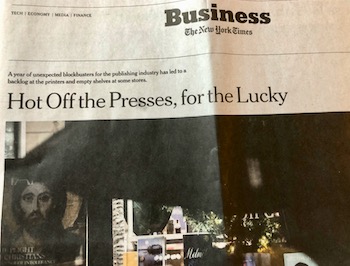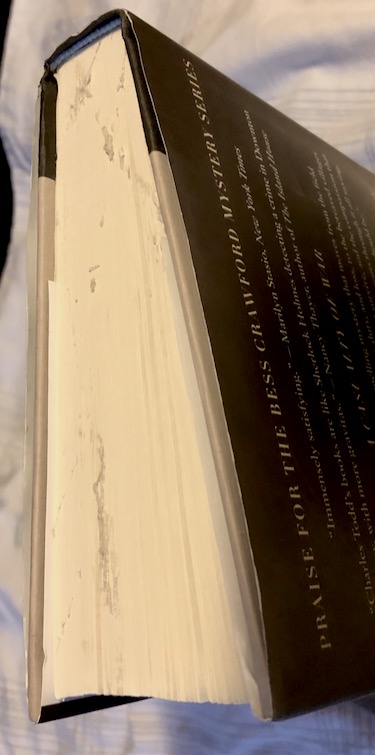Hot Off the Presses, for the Lucky,
tales of the great December squeeze

There’s good news—and bad news—as we start .
As we reported in a November column, our authors are celebrating news that saw another nationwide rise in book sales, especially for the broad category in which most of our authors write: adult nonfiction.
Then came December!
Sales continued to roar along—but the capacity of the American publishing industry hit yet another nationwide holiday squeeze. The squeeze wasn’t news to anyone in this business. In and , the last two months of the calendar brought agonizing slowdowns as orders overwhelmed the industry. We also experienced a rise in occasional printing-and-binding errors from these over-stressed factories, which had to be corrected through replacement orders any time damaged books made it through the system to readers.
Headaches During the Holidays
, millions of readers beyond the publishing industry took notice. On Christmas Eve, Alexandra Alter wrote a lengthy report for The New York Times, headlined: Hot Off the Presses, for the Lucky—A year of unexpected blockbusters for the publishing industry has led to a backlog at the printers and empty shelves at some stores.
Alter got most of the story right. She wrote:
What should be good news for publishers, agents and authors has created headaches during the crucial holiday sales season, as printing presses struggle to keep up with a surge in demand, creating a backlog that has led to stock shortages of popular titles. …
The industrywide paper jam has been building for months—a result of shrinking and consolidation among printing companies, the collapse of one of the major printers this summer, global paper shortages and a tightening job market that’s made it difficult for printers to hire additional seasonal workers. But it has become increasingly acute and visible at the industry’s peak sales season, when consumers are shopping for must-read titles to give as gifts, and finding that Amazon’s virtual shelves are bare.
Problems with Book-Release Dates

Alter’s in-depth report accurately identified some of the most crucial problems.
One of the biggest is that publishers are finding themselves scrambling to properly schedule book-release dates—so that they can be confident books will ship in a timely way to author launch events. Alter reports on one case at Norton where an author suddenly discovered he couldn’t get books until a month after his planned events!
That results in industry-wide scrambling. Here at Font Edge Publishing, our staff is well aware of those struggles. Almost without warning, publishers now discover that books won’t arrive on time—and emergency rush fees
and workarounds must be found.
When the Glue Goes Wild

The one key problem Alter missed in her report is that—as printer-binders struggle to keep up with demand—they often add additional workers who aren’t able to keep up with the increasingly sophisticated machines they are asked to operate. Errors can show up in the trimming of book edges, the binding process and even in the high-tech glue that holds books together.
Several of our authors were hit with these errors, which we discovered only after books had shipped. In one case, several hardbacks were not properly glued and pages fell out as they were turned. Of course, those books were replaced by the factory. In another case, author Linda Jarkey received some Sadie Sees Trouble books that looked like an untrained worker had perhaps tripped at the glue station—splashing glue all over a series of books.
And our authors certainly were not alone! Other big publishers noticed these same problems. In addition to showing a photo of a glue-splashed Sadie book (above)—we’re also including a photo of a glue-gummed copy of bestselling mystery writer Charles Todd’s new A Forgotten Place. When that book arrived, it was almost impossible to open because those splashes of glue had fused too many pages!
The Best of Times in Publishing—Really!
So, if you’re an author or a reader who has noticed delays or, worse yet, a badly produced book with obvious problems in the binding—you’re not alone! If the book was produced by another publisher, contact Amazon or whatever bookseller provided that book. They certainly should replace those copies.
If you’re a customer of Front Edge Publishing—or any of our imprints—contact us and we definitely will make good on any glue-splattered or otherwise obviously damaged books.
As we begin a new year of publishing, remember: Overall, the news is very good!
There’s not a better time to publish a new book!
Except, we’ve now learned, in the month of December.
Got a new book project you want to discuss with us? Now’s the time to email us!
Have a Happy New Year! Keep reading! And, keep writing!